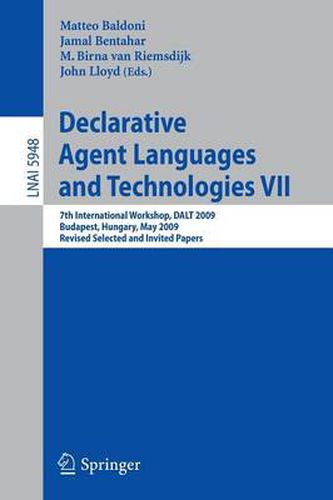Readings Newsletter
Become a Readings Member to make your shopping experience even easier.
Sign in or sign up for free!
You’re not far away from qualifying for FREE standard shipping within Australia
You’ve qualified for FREE standard shipping within Australia
The cart is loading…






This title is printed to order. This book may have been self-published. If so, we cannot guarantee the quality of the content. In the main most books will have gone through the editing process however some may not. We therefore suggest that you be aware of this before ordering this book. If in doubt check either the author or publisher’s details as we are unable to accept any returns unless they are faulty. Please contact us if you have any questions.
In the multi-agent systems area, linking theory to practical applications is still a fertile research topic. The aim of the workshop on Declarative Agent Languages and Technologies (DALT 2009), in its seventh edition this year, is to achieve this goal, which needs developing and using advanced declarative technologies and languages, particularly agent programming, communication languages, and reasoning and decision-making mechanisms. Developing these technologies is a particularly challenging issue from many perspectives: formal foundations, pr- ticalfeasibility,degreeof?exibility,etc. Inthiscontext,thedeclarativeparadigm is arguably the most appropriate as unlike imperative approaches, the focus is onwhatthe solutionshouldaccomplishratherthanondescribing howto acc- plish it. This is because agentcomputing, as a paradigm,is about describing the logic of computation instead of describing how to accomplish it. DALT is about investigating,studying, andusing the declarativeparadigmaswell ascombining declarative and formal approaches with engineering and technology aspects of agents and multi-agent systems. This volume presents the latest developments in the area of declarative l- guagesandtechnologies,whichaimtoproviderigorousframeworksfordesigning, specifying, implementing and verifying autonomous interacting agents. These frameworksarebasedoncomputationallogicsand other formalmethods suchas mathematical models and game theoretical approaches. Using such models and approaches facilitates the development of agents that reason and act rationally while at the same time being able to verify the behavior of these agents against their speci?cation. The main theme of DALT 2009 was the further advan- ment of relevant speci?cation and veri?cation techniques, such as, for instance, modal and epistemic logics, model checking, constraint logic programming, and distributed constraint satisfaction.
$9.00 standard shipping within Australia
FREE standard shipping within Australia for orders over $100.00
Express & International shipping calculated at checkout
This title is printed to order. This book may have been self-published. If so, we cannot guarantee the quality of the content. In the main most books will have gone through the editing process however some may not. We therefore suggest that you be aware of this before ordering this book. If in doubt check either the author or publisher’s details as we are unable to accept any returns unless they are faulty. Please contact us if you have any questions.
In the multi-agent systems area, linking theory to practical applications is still a fertile research topic. The aim of the workshop on Declarative Agent Languages and Technologies (DALT 2009), in its seventh edition this year, is to achieve this goal, which needs developing and using advanced declarative technologies and languages, particularly agent programming, communication languages, and reasoning and decision-making mechanisms. Developing these technologies is a particularly challenging issue from many perspectives: formal foundations, pr- ticalfeasibility,degreeof?exibility,etc. Inthiscontext,thedeclarativeparadigm is arguably the most appropriate as unlike imperative approaches, the focus is onwhatthe solutionshouldaccomplishratherthanondescribing howto acc- plish it. This is because agentcomputing, as a paradigm,is about describing the logic of computation instead of describing how to accomplish it. DALT is about investigating,studying, andusing the declarativeparadigmaswell ascombining declarative and formal approaches with engineering and technology aspects of agents and multi-agent systems. This volume presents the latest developments in the area of declarative l- guagesandtechnologies,whichaimtoproviderigorousframeworksfordesigning, specifying, implementing and verifying autonomous interacting agents. These frameworksarebasedoncomputationallogicsand other formalmethods suchas mathematical models and game theoretical approaches. Using such models and approaches facilitates the development of agents that reason and act rationally while at the same time being able to verify the behavior of these agents against their speci?cation. The main theme of DALT 2009 was the further advan- ment of relevant speci?cation and veri?cation techniques, such as, for instance, modal and epistemic logics, model checking, constraint logic programming, and distributed constraint satisfaction.